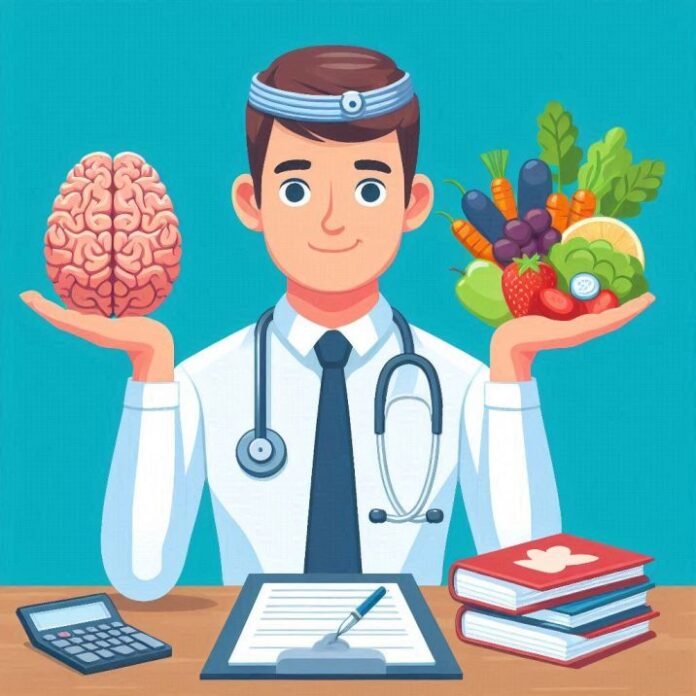In our pursuit of overall well-being, the profound connection between what we consume and our mental state often goes unnoticed. However, emerging research in the field of nutritional psychiatry has unveiled a compelling truth: the foods we choose to nourish our bodies can significantly impact our mental health.
This article delves into the intricate interplay between nutrition and mental health, exploring the potential of dietary interventions to alleviate and potentially prevent various mental disorders. By understanding the crucial role of nutrition in our cognitive and emotional well-being, we can make informed choices that promote a healthier, more balanced state of mind.
I. Role of Nutrition in Mental Health
Defining Nutritional Psychiatry
Nutritional psychiatry is an emerging field that investigates the bidirectional relationship between nutrition and mental health. It explores how the nutrients we consume can influence our cognitive function, mood, and overall psychological well-being.
The Importance of Understanding Nutrition’s Role in Mental Health
In an era where mental health disorders are becoming increasingly prevalent, understanding the impact of nutrition on our mental state is of paramount importance. By recognizing the intricate connections between the foods we eat and our psychological well-being, we can unlock new avenues for preventive and therapeutic interventions.
II. Impact of Nutrition on Mental Health
Positive Effects of a Balanced Diet
A balanced diet, rich in whole foods, fruits, vegetables, lean proteins, and healthy fats, can have a profound positive impact on our mental health. These nutrient-dense foods provide essential vitamins, minerals, and antioxidants that support brain function, regulate neurotransmitter levels, and reduce inflammation – all crucial factors in promoting mental well-being.
Negative Effects of Processed Foods
On the contrary, a diet high in processed foods, refined sugars, and unhealthy fats can contribute to a heightened risk of mental health issues. These foods often lack essential nutrients, disrupt gut health, and promote inflammation, all of which can negatively impact mood, cognitive function, and overall mental well-being.
III. Nutritional Interventions for Mental Health Disorders
Selective Food Supplementation
Research has shown that selective food supplementation with specific nutrients can have a positive impact on mental health disorders. For instance, omega-3 fatty acids have been found to be beneficial in managing depression and anxiety, while B vitamins play a crucial role in regulating mood and cognitive function.
Rational Diet, Physical Activity, and Psychobiotics
A holistic approach that combines a rational diet, regular physical activity, and the use of psychobiotics (probiotics that positively influence mental health) has shown promising results in alleviating symptoms of various mental disorders, including depression and anxiety.
Consumption of Antioxidants
Increasing the intake of antioxidants, found in fruits, vegetables, and certain spices, can help combat oxidative stress and inflammation, which are known contributors to mental health issues such as depression and cognitive decline.
IV. Preventive Interventions for Mental Disorders
Lifestyle Changes
Adopting a healthy lifestyle, which includes regular exercise, stress management techniques, and a balanced diet, can play a crucial role in preventing the development of mental health disorders.
Nutritional Interventions
Incorporating nutritional interventions, such as dietary modifications and targeted supplementation, can help address nutrient deficiencies and support brain function, potentially reducing the risk of mental health issues.
V. Conclusion
Summary of Nutrition’s Importance in Mental Health
In conclusion, the emerging field of nutritional psychiatry has shed light on the profound impact of nutrition on our mental well-being. By understanding the intricate relationship between the foods we consume and our cognitive and emotional state, we can take proactive steps to support our mental health through informed dietary choices.
Encouragement for Informed Dietary Choices
As we continue to unravel the mysteries of this fascinating field, it is essential to embrace a holistic approach that combines a balanced diet, regular physical activity, and mindful lifestyle practices. By making informed choices and prioritizing nutrition, we can pave the way for a healthier, more resilient mind and a greater overall sense of well-being.
List 1: Key Nutrients for Mental Health
- Omega-3 fatty acids: Found in fatty fish, walnuts, and flaxseeds, these essential fats play a crucial role in brain function and have been linked to improved mood and cognitive performance.
- B vitamins: Particularly B12, B9 (folate), and B6, these vitamins are essential for proper brain function and neurotransmitter regulation, supporting mental well-being.
- Vitamin D: Often referred to as the “sunshine vitamin,” vitamin D plays a role in regulating mood and has been associated with a reduced risk of depression and anxiety.
- Magnesium: This mineral is involved in numerous brain processes and has been linked to improved mood and cognitive function.
List 2: Foods to Incorporate for Better Mental Health
- Leafy green vegetables (spinach, kale, arugula)
- Fatty fish (salmon, mackerel, sardines)
- Berries (blueberries, raspberries, strawberries)
- Nuts and seeds (walnuts, almonds, chia seeds)
- Fermented foods (yogurt, kefir, sauerkraut)
- Whole grains (quinoa, oats, brown rice)
| Nutrient | Food Sources | Potential Mental Health Benefits |
|---|---|---|
| Omega-3 Fatty Acids | Fatty fish, walnuts, flaxseeds | Improved mood, cognitive function |
| B Vitamins | Meat, poultry, eggs, legumes | Neurotransmitter regulation, brain function |
| Vitamin D | Fatty fish, egg yolks, fortified foods | Reduced risk of depression and anxiety |
| Magnesium | Spinach, pumpkin seeds, avocado | Improved mood, cognitive performance |
The table above provides a quick reference for key nutrients, their food sources, and their potential mental health benefits, highlighting the importance of a varied and nutrient-dense diet for optimal mental well-being.

